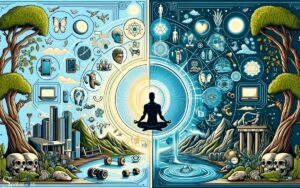Spiritual Beliefs Vs Religious Beliefs: Prayers!
Spiritual beliefs and religious beliefs are two distinct concepts that often interplay but have their own unique characteristics and implications.
While spiritual beliefs are personal and individualistic, focusing on one’s inner path and connection with the universe or a higher power, religious beliefs are structured and community-oriented, often involving organized practices and doctrines associated with a specific religion.
Religious beliefs, on the other hand, are typically based on the teachings of a religious institution and involve communal activities such as attending church, mosque, synagogue, or temple.
They often include specific rituals, prayers, and moral codes that are to be followed by the adherents.
Key Differences:
Origin: Spiritual beliefs can originate from personal experiences; religious beliefs are rooted in established traditions. –
Practices: Spiritual practices are often self-directed; religious practices are communal and prescribed. –
Authority: Spiritual beliefs may not recognize an external authority; religious beliefs often involve hierarchical leadership. –
Community: Spirituality can be practiced alone; religion generally involves a community of believers.
In a world where personal identity and freedom of belief are highly valued, the rise of individuals who consider themselves ‘spiritual but not religious’ underscores a shift towards a more personal and less institutionalized approach to faith.
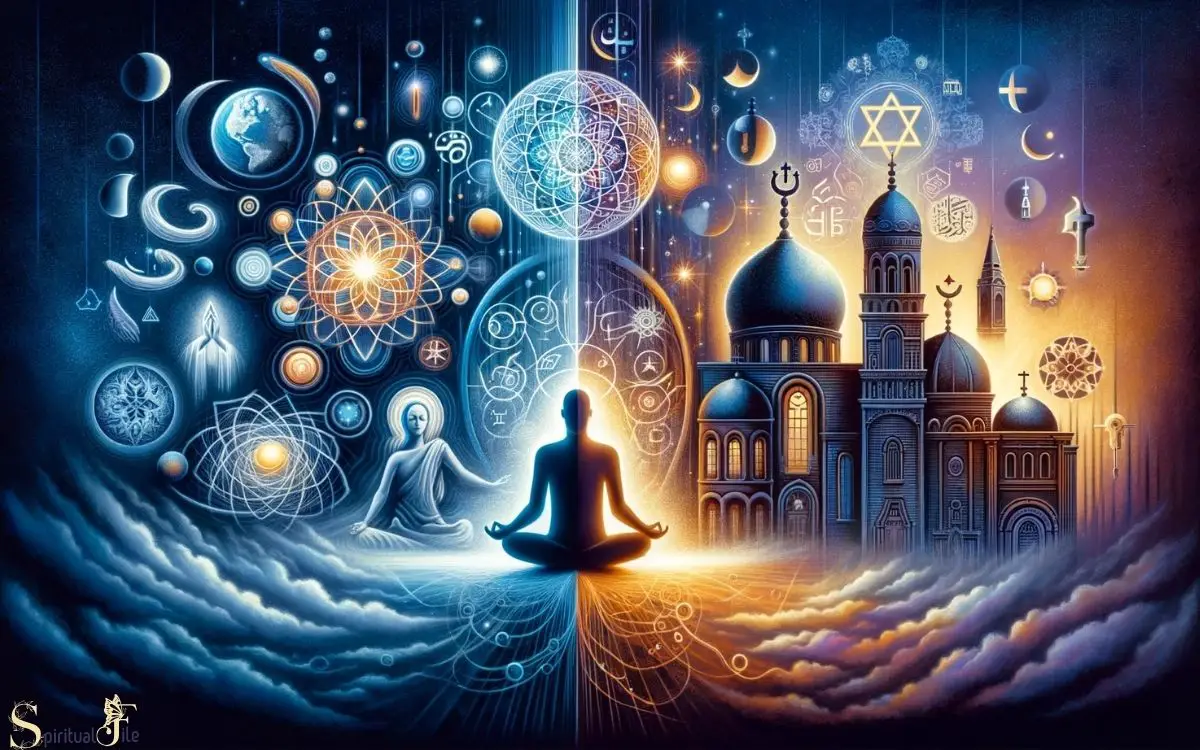
Key Takeaway
3 Aspects: Spiritual Beliefs Vs Religious Beliefs
| Aspects | Spiritual Beliefs | Religious Beliefs |
|---|---|---|
| Source of beliefs | Internal, personal experience | External authority like sacred texts or leaders |
| Community | Individualistic, personal path | Organized groups, rituals, traditions |
| View of divine | God as abstract, universal energy | God as anthropomorphic being with rules |
Origins and Definitions
While both spiritual beliefs and religious beliefs involve matters of faith and transcendence, they differ in their origins and definitions.
Religious beliefs are typically tied to organized systems of practices and doctrines, often centered around a deity or deities.

These beliefs are often codified in sacred texts and are passed down through generations within specific cultural and institutional frameworks.
In contrast, spiritual beliefs are more personal and individualistic, often focusing on an individual’s inner experiences, connection to the universe, and the search for meaning and purpose in life.
They may or may not be associated with organized religions and can encompass a wide range of perspectives, including but not limited to theistic, non-theistic, and nature-based beliefs.
The definitions and origins of these beliefs shape the ways in which individuals understand and practice their faith and transcendence.
Core Principles and Practices
Core principles and practices in both spiritual beliefs and religious beliefs have evolved over time, reflecting the cultural, historical, and philosophical contexts in which they originated.
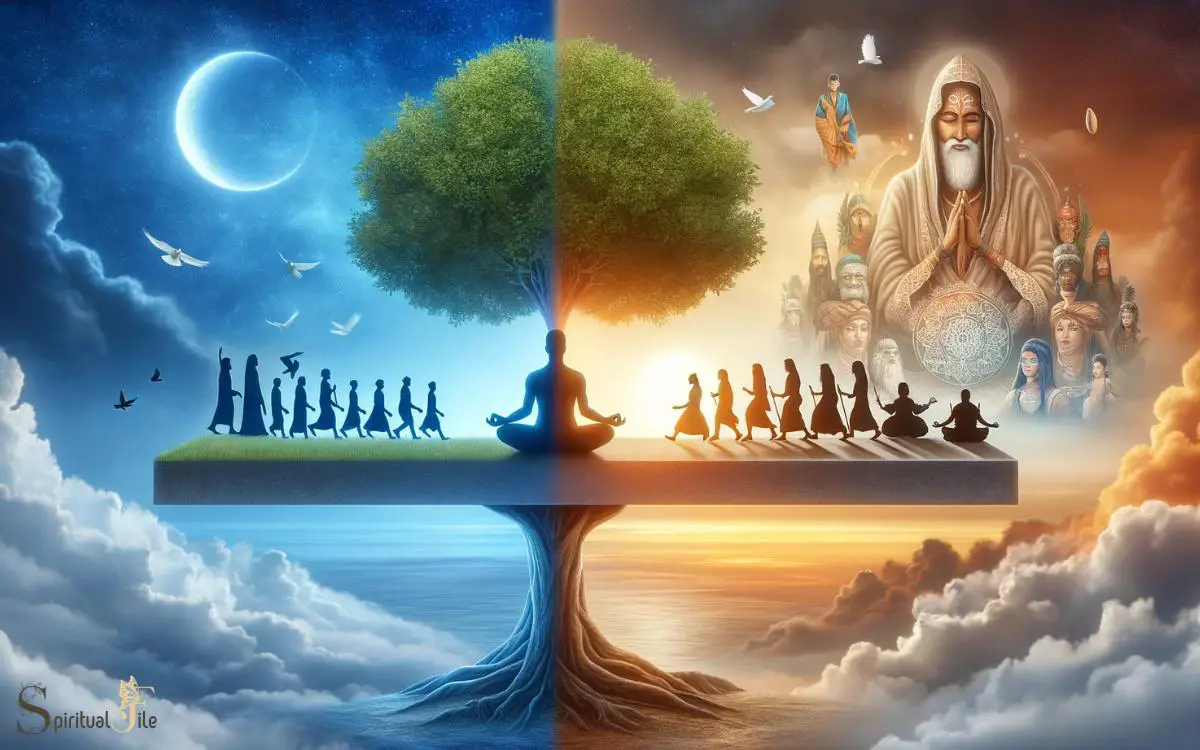
When comparing the two, it is important to note that:
- Spiritual beliefs often emphasize individual experiences and a personal connection to the divine, while religious beliefs may place a greater emphasis on communal rituals and organized worship.
- Both spiritual and religious beliefs involve ethical teachings and guidelines for moral conduct, although the sources and interpretations of these principles may differ.
- Rituals and practices in spiritual beliefs often involve meditation, mindfulness, and introspection, while religious practices may include structured prayers, sacraments, and specific rites of passage.
- The interpretation and flexibility of core principles can vary widely within spiritual beliefs, while religious beliefs may be more standardized and governed by established doctrines and traditions.
Transition into the subsequent section about ‘authority and structure’ is crucial for understanding the differences and similarities between spiritual beliefs and religious beliefs.
Authority and Structure
The authority and structure within spiritual beliefs and religious beliefs play a significant role in shaping the governance and organizational aspects of each belief system.
Religious beliefs often have a hierarchical structure with defined leadership roles, such as priests, rabbis, or imams, who interpret and enforce the teachings of the faith. This structured authority provides a clear framework for decision-making and guidance for the followers.
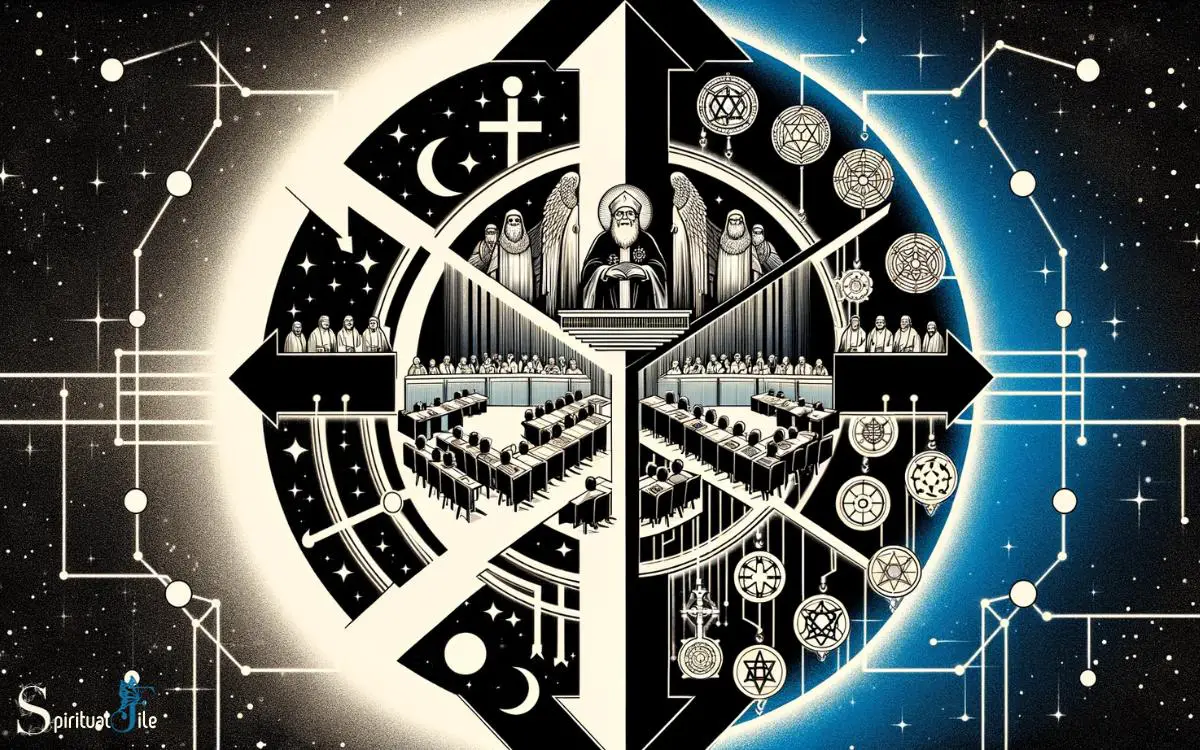
In contrast, spiritual beliefs often emphasize individual autonomy and personal connection with the divine, leading to a more decentralized and fluid organizational structure. This can allow for a greater diversity of beliefs and practices within spiritual communities.
Understanding the authority and structure within these belief systems provides insight into how they are governed and how decisions are made. This sets the stage for exploring the personal connection and experience within each belief system.
Personal Connection and Experience
An essential aspect of both spiritual beliefs and religious beliefs is the individual’s personal connection and experience with the divine or higher power.

This personal connection and experience can manifest in various ways:
- Prayer and Meditation: Individuals often seek personal connection through prayer or meditation, where they communicate with or seek guidance from their perceived higher power.
- Miraculous Events: Some individuals cite personal experiences of miracles or divine interventions as evidence of their connection with the divine.
- Inner Peace and Fulfillment: Many people report a deep sense of inner peace, fulfillment, and purpose as a result of their personal connection with their spiritual or religious beliefs.
- Sense of Presence: Individuals may feel a tangible sense of the presence of the divine during moments of worship, reflection, or spiritual practice.
These personal connections and experiences often form the foundation of an individual’s spiritual or religious beliefs.
Social Impact and Community
A significant aspect of both spiritual beliefs and religious beliefs is their impact on social communities and interactions.
Spiritual beliefs often focus on personal growth, individual connection, and the interconnectedness of all beings.
This can lead to a sense of community that extends beyond traditional religious boundaries, fostering inclusivity and understanding.
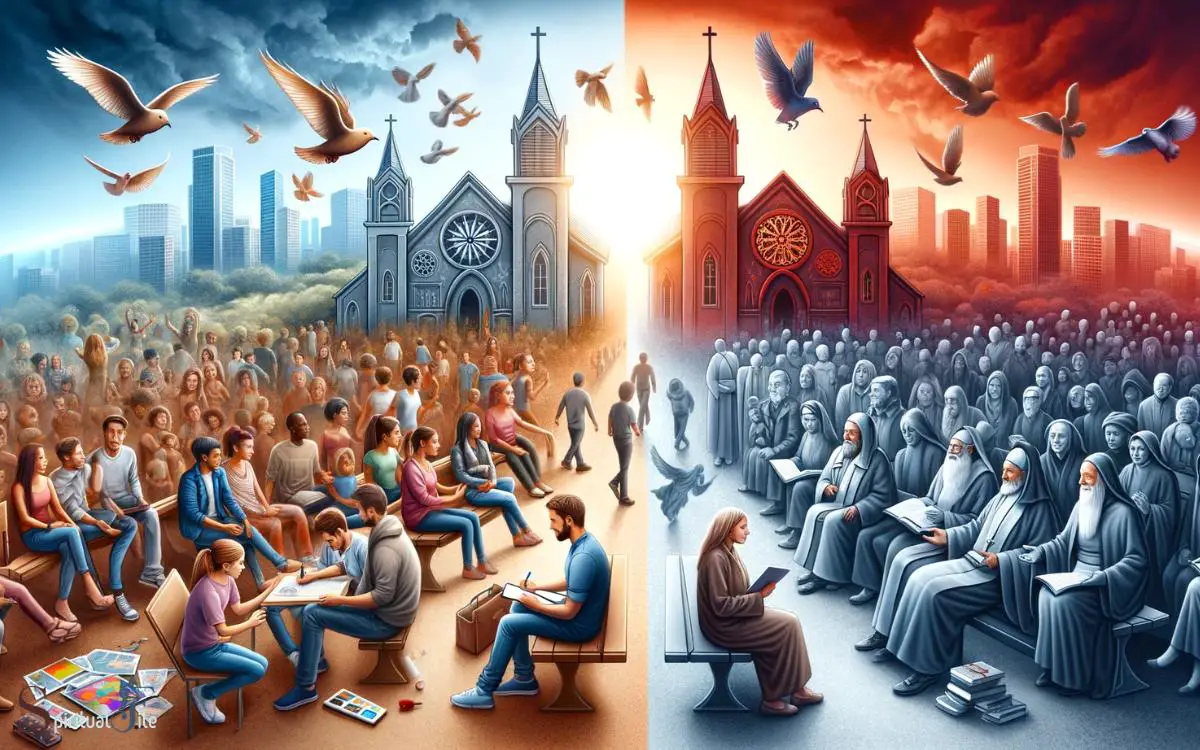
On the other hand, religious beliefs often provide a structured framework for communal worship, fellowship, and shared values. Religious communities can offer a sense of belonging, support, and collective purpose.
Both spiritual and religious beliefs have the potential to shape social norms, influence charitable activities, and promote ethical behavior within communities.
Ultimately, whether through spiritual exploration or religious practice, individuals seek to find meaning, support one another, and contribute positively to the social fabric.
Flexibility and Adaptability
When it comes to spiritual beliefs versus religious beliefs, flexibility and adaptability play a crucial role in shaping individual perspectives.
Personal interpretation and evolution allow individuals to incorporate new ideas and experiences into their spiritual beliefs, fostering growth and development.
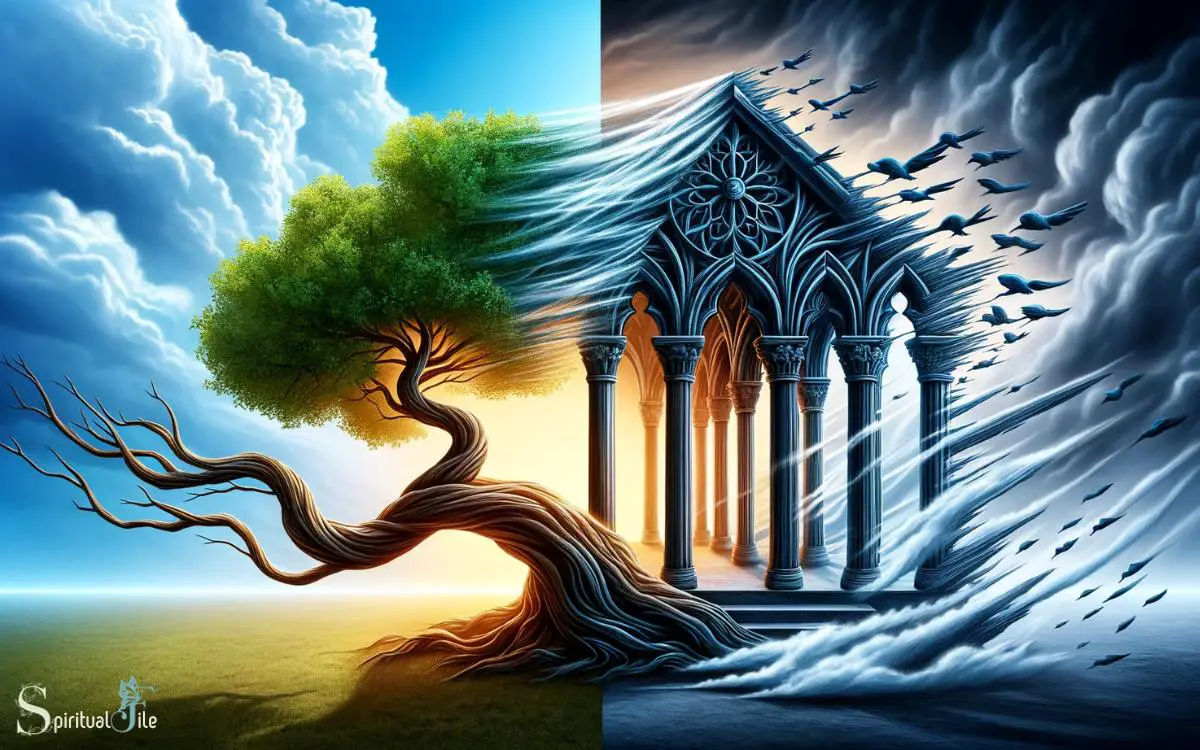
Additionally, openness to diverse influences enables individuals to embrace different perspectives and adapt their beliefs to accommodate new knowledge and understanding.
Personal Interpretation and Evolution
Individuals must demonstrate flexibility and adaptability in their personal interpretation and evolution of spiritual and religious beliefs.
This involves:
- Embracing change: Being open to reevaluating and updating one’s beliefs as new information and experiences are encountered.
- Seeking understanding: Engaging in thoughtful reflection and seeking knowledge from diverse sources to enrich one’s spiritual and religious perspectives.
- Respecting diversity: Acknowledging and appreciating the wide variety of beliefs and practices that exist, and being open to learning from different traditions.
- Embodying compassion: Using one’s spiritual and religious beliefs as a foundation for empathy and kindness towards others, regardless of their beliefs.
These principles allow individuals to continually evolve and grow in their spiritual and religious beliefs, fostering a deeper understanding of themselves and the world around them. This openness to diverse influences enriches their spiritual journey.
Openness to Diverse Influences
Demonstrating flexibility and adaptability in the evolution of spiritual and religious beliefs requires embracing diverse influences with an open mind.
Openness to diverse influences allows individuals to consider various perspectives, traditions, and practices, leading to a more enriched understanding of spirituality and religion.
It fosters an environment where different beliefs and customs can coexist harmoniously, promoting tolerance and respect for cultural diversity.
Flexibility and adaptability enable individuals to evolve their beliefs in response to new knowledge and experiences, enabling spiritual and religious practices to remain relevant and meaningful in a changing world.
Embracing diverse influences also encourages collaboration and dialogue among different belief systems, fostering unity and mutual understanding.
Ultimately, openness to diverse influences promotes a dynamic and inclusive approach to spirituality and religion, enriching the human experience.
Are Spiritual Rest and Religious Beliefs Connected Through Prayer?
Achieving physical and spiritual rest through prayer is often linked to religious beliefs. Many people find a deep sense of peace and clarity by turning to prayer as a way to connect with a higher power and seek solace in times of need. This connection between rest, spirituality, and religious practices is a foundational aspect of many faith traditions.
Frequently Asked Questions
How Do Spiritual Beliefs and Religious Beliefs Differ in Terms of Their Impact on Mental Health and Well-Being?
Spiritual beliefs and religious beliefs impact mental health and well-being differently.
Understanding these distinctions is crucial to providing effective support. Each belief system offers unique perspectives, practices, and sources of comfort that can influence individuals’ mental health outcomes.
Can Individuals Hold Both Spiritual and Religious Beliefs Simultaneously, and if So, How Do They Reconcile Any Potential Conflicts Between the Two?
Yes, individuals can hold both spiritual and religious beliefs simultaneously.
They often reconcile potential conflicts by recognizing that spirituality is personal and can complement religious practices. This integration allows for a diverse and enriched spiritual experience.
What Role Do Spiritual and Religious Beliefs Play in Shaping an Individual’s Moral and Ethical Framework?
Spiritual and religious beliefs influence an individual’s moral and ethical framework by providing guiding principles, values, and codes of conduct.
They offer a sense of purpose, meaning, and connection to something greater, shaping one’s worldview and decision-making.
How Do Spiritual and Religious Beliefs Influence an Individual’s Approach to Environmental Conservation and Sustainability Efforts?
Spiritual and religious beliefs can significantly influence an individual’s approach to environmental conservation and sustainability efforts.
These beliefs often shape attitudes towards nature, stewardship, and the intrinsic value of the environment, impacting behaviors and actions towards environmental protection.
What Are the Potential Implications of Spiritual and Religious Beliefs on Global Political and Social Movements?
The potential implications of spiritual and religious beliefs on global political and social movements are significant.
They can influence values, ideologies, and policies, impacting social justice movements, political decisions, and international relations. Understanding these implications is crucial for effective global governance.
Conclusion
The interplay between spiritual beliefs and religious beliefs can be likened to a delicate dance of interconnected threads, weaving together the fabric of human experience.
Like the intertwining roots of ancient trees, these beliefs draw nourishment from the same soil of human yearning and longing for meaning.
While spiritual beliefs may flow like a meandering river, adapting to the landscape of individual experience, religious beliefs stand like timeless mountains, anchoring communities in tradition and structure.


